June 10, 2015 | 20th Anniversary Conference
Celebrating 20 Years of Promoting Women's Leadership and Voices
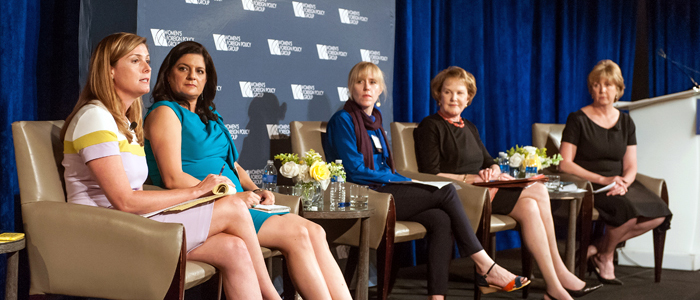
Washington, DC—“Covering the World’s Hot Spots: The Inside View featured journalists Margaret Warner, chief foreign affairs correspondent for PBS NewsHour; Missy Ryan, pentagon correspondent for The Washington Post; Indira Lakshmanan, foreign policy correspondent for Bloomberg News; and Lara Jakes, deputy managing editor for news at Foreign Policy Magazine and ForeignPolicy.com. The discussion was moderated by Elisabeth Bumiller, Washington editor for The New York Times. The panel covered a variety of topics, including the conflict in Ukraine, new Pentagon leadership, recent events in Yemen, the Iran nuclear talks, Iraq and the situation created by ISIS, the new administration in Afghanistan, the experience of reporting on the ground, and the future of foreign policy news coverage.
Margaret Warner spoke about the conflict in Ukraine and described the Russian action to reclaim a former Soviet Republic as a move designed to destabilize the post-Cold War order that the US and Europe have tried to maintain. She addressed the confusion among US and European officials about Russian President Vladimir Putin’s motivations and ultimate goals, citing his desire to maintain a frozen conflict on the border with Russia in order to weaken Ukraine, or a demonstration of his ability to undermine NATO. Warner does not think the White House will arm Ukraine, and instead will try to support them in alternative ways, such as funding, intelligence, and logistical assistance. President Obama does not want this to turn into a proxy war with Russia, especially since recent polls have overwhelmingly shown that the American people will not support it in Ukraine or any other former Soviet states.
Missy Ryan discussed Ashton Carter’s succession of Chuck Hagel as the secretary of defense and highlighted the differences between them. She stated that Hagel was an “affable man…with a distinguished record in the Senate,” while Carter “has strong opinions [and] a forceful personality.” He has made it clear to this administration that he intends to leave behind a tangible legacy even though he will only serve for a short period of time. Ryan also described Carter’s previous accomplishments as deputy secretary of defense. In that position, he was concerned with the “institutional things that…matter a lot in an organization as big as the US military,” such as procurement, personnel, recruitment, and retention. She also described his efforts to connect Pentagon staff with the Silicon Valley community to enhance their technological capabilities.
Ryan also spoke about the situation in Yemen and explained how the conflict has developed into a proxy war between the Houthi rebels supported by Shiite Iran, and the military coalition organized by Sunni Saudi Arabia. The Saudi bombing campaign has killed at least 2,000 Yemenis and left thousands of others displaced in what has become another urgent humanitarian crisis in the region. Warner added that the US’s response to the crisis in Yemen is an example of the Obama Doctrine, which is predicated on the fact that the US will provide technological and air assistance, but that local actors will operate on the ground; this policy was seen as largely successful in Yemen until very recently. Ryan underscored that the conflict demonstrates the limits of US military influence in the Middle East, as we do not have the ability or desire to become entangled in yet another war in the region.
Indira Lakshmanan detailed her experience covering two secretaries of state, John Kerry and Hillary Clinton, compared with her experience as an independent foreign policy correspondent on the ground. She discussed the different styles in which they conduct themselves: Kerry presents the information informally and in a relaxed manner, while Clinton was more disciplined and reserved with the press. Kerry has also been very involved in specific policy negotiations, especially in the Middle East, whereas Clinton focused more on thematic issues, such as the campaign to restore the view of the US abroad through displays of public diplomacy. Lakshmanan contrasted covering foreign policy in the field with covering it from Washington, explaining that there is “much more freedom…to talk to real people and individuals” in the field. In her opinion, when covering foreign policy from “inside the bubble” of Washington, “everything is controlled for you from your water and your food and the hotel you’re going to stay in to…the information, frankly, that you’re given.”
On the P5+1 Iran nuclear negotiations in Vienna, Lakshmanan believes there will be a deal pending the resolution of several main provisions. These include international inspections and access to both declared nuclear sites and suspected covert sites; the complicated process and conditions for unraveling the sanctions; and the complete accounting of any possible overlooked military dimensions of the nuclear programs. The time-frame of this agreement is also a concern, as some facilitators and onlookers want to ensure that it explicitly limits Iran’s nuclear capabilities more permanently. When asked about Secretary Kerry’s role in the negotiations, she said he is engaged with his nuclear team almost daily; if the parties arrive at an agreement, Kerry will travel to Vienna to ensure that it is solidified. The next challenge then becomes presenting the deal to Congress for their approval, which Lakshmanan and Warner both agreed would not be an easy feat.
Lara Jakes spoke about the current situation in Iraq and recent US military responses. Drawing on her extensive experience on the ground, she stated that fears of the rise of the Islamic State had appeared several years ago, and she and others on the ground questioned the Iraqi government and the US Embassy in Baghdad on how enduring instability would affect the US’s exit strategy. She reported that in many of their responses, it was evident that military and policy officials were not receptive to any concerns that could potentially prolong the war. Today, the Islamic State controls a third of the territory in Iraq and Syria and affiliated groups have emerged in other parts of the region. The day of the panel, it was announced that the US would send another 450 trainers to Iraq; this would bring the number of US troops on the ground to about 3,500, which is what the Iraqi government requested from the US in 2011. She stressed that future stability is incumbent on the United States, as the Iraqi people desperately want our leadership and guidance to achieve lasting peace in their country.
Regarding Afghanistan, Ryan expressed hope for the future based on the formation of the new unity government with Ashraf Ghani as president and Abdullah Abdullah as chief executive officer of the country. She thinks their partnership has been relatively effective so far. Jakes addressed the reluctance to remove all US troops from Afghanistan by 2016 because of the cyclical nature of insurgencies. She stated that “insurgents and extremists…lie low when they think that troops are leaving so that they can come back with a vengeance when they think the coast is clear,” which is exactly what occurred in Iraq. While acknowledging the difficulties that lie ahead, Warner and Lakshmanan both spoke about the improved standard of living and increased access to healthcare and education for all Afghans. They also agreed that to counter the ideological forces who oppose the progress of the last decade, it is imperative that Ghani and Abdullah negotiate a settlement with the insurgents.
The panelists also shared some of the most dangerous moments they have experienced in their coverage of foreign policy. They all agreed that they were genuinely concerned about the people they left behind. Lakshmanan shared her experience writing a series about the rise of piracy on the high seas where she gained several different perspectives of those most affected by this issue. Warner and Ryan both shared their experiences during the Arab Spring where they witnessed the celebration of freedom from repression, and followed that up with reflections on the challenges and turmoil still facing many of these countries.
In terms of areas of foreign policy that are underreported on in the US media, Warner cited China, India, and Southeast Asia, whereas Ryan focused on Latin America and the drug war. Lakshmanan called for more thoughtful coverage, with an increased focus on thematic, long-term developments, rather than short news briefs that lack meaningful analysis. Jakes described how news organizations need to cover more people to understand how our policies impact people around the world. When asked about the future of foreign policy reporting, Jakes also stressed that nothing replaces content or the “people who are willing to go out there and go get it.” Despite budget restrictions for foreign policy coverage, the journalists agreed that increased curiosity about international affairs and the interconnectedness of our world today will allow foreign news coverage to survive.
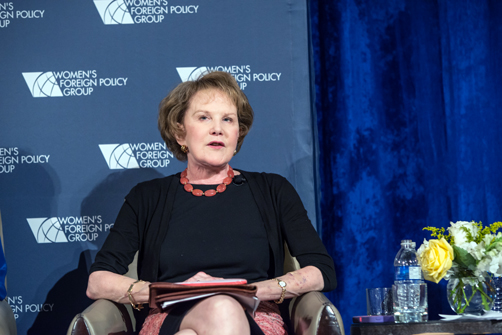 |
 |
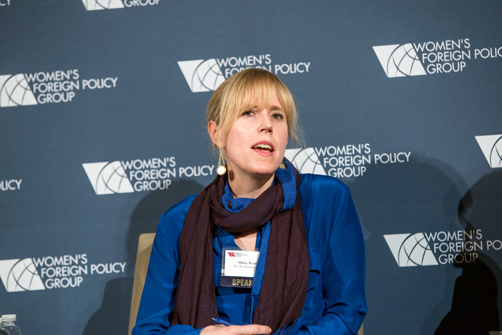 |
Margaret Warner, Chief Foreign Affairs Correspondent
of PBS NewsHour
|
|
Missy Ryan, Pentagon Correspondent of
The Washington Post
|
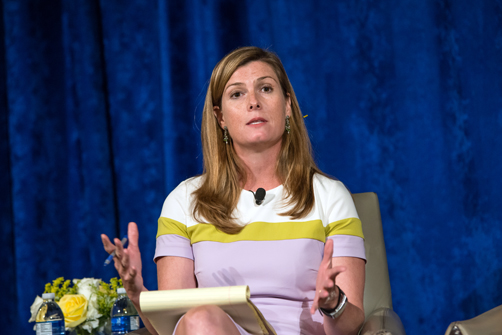 |
 |
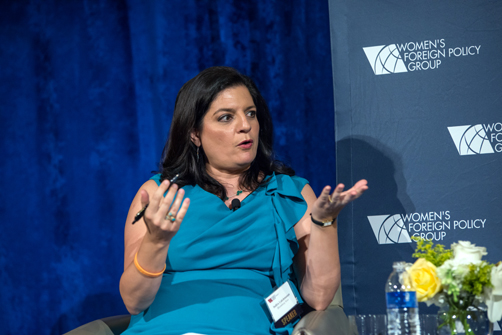 |
Lara Jakes, Deputy Managing Editor for News of
Foreign Policy Magazine and ForeignPolicy.com
|
|
Indira Lakshmanan, Foreign Policy Correspondent
of Bloomberg News
|
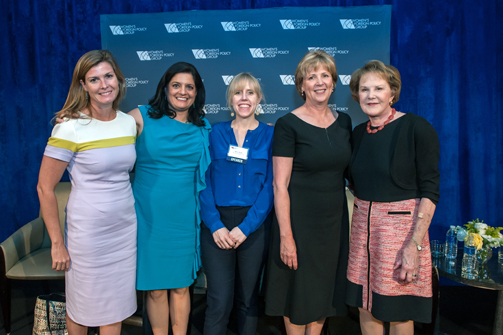 |
 |
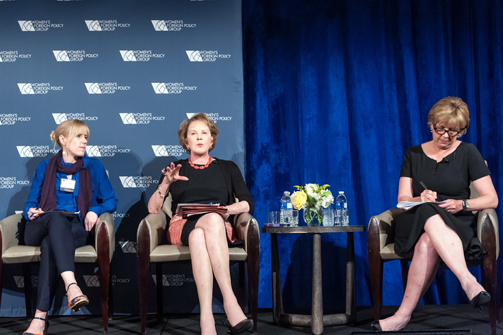 |
Panelists with Elizabeth Bumiller,
Washington Editor of The New York Times
|
|
Elizabeth Bumiller moderates the discussion
|
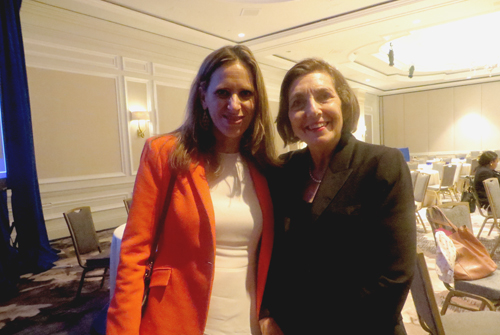 |
 |
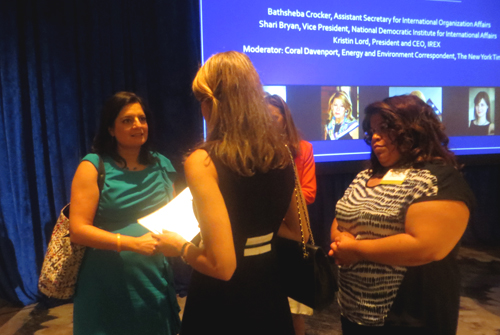 |
Ambassador Cecilia Nahón of Argentina with
WFPG President Patricia Ellis after the discussion
|
|
Indira Lakshmanan speaks to WFPG guests after the panel
|